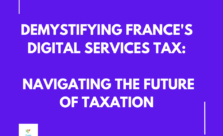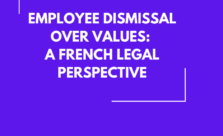In an ever-evolving work environment, expat professionals in Paris must stay informed about the latest employment regulations.
As of November 1, 2023, French employers are mandated to communicate specific information to their employees, ensuring compliance with EU laws.
This brief piece delves into these new obligations, highlighting their significance and impact for expats working in France.
- Identification of Parties: Consider an expat named Alex, who has recently moved to Paris for a job in a multinational corporation. Upon joining, Alex is informed about the company’s parent organization based in the U.S. and its subsidiary in France, where Alex is employed. This “Identification of Parties” clause ensures Alex is aware of the legal entities involved – the U.S.-based parent company and the French subsidiary.This knowledge is crucial for Alex in understanding who the legal employer is, which laws govern the employment contract, and whom to approach for specific employment-related issues. This clarity is particularly important in a cross-border work scenario like Alex’s, where understanding the nuances of a foreign legal system is key to navigating employment relationships effectively.
- Work Location and Employer Address: Imagine Sarah, an expat graphic designer who has recently moved to Paris for a new job. Her employer, a creative agency, has multiple offices across the city. By providing the specific work location and the company’s official address, Sarah can make informed decisions about where to live, how to plan her daily commute, and even which schools or childcare options to consider for her children. This information is particularly valuable for expats like Sarah, who are unfamiliar with the city’s geography and transportation options, and need to integrate their work location into their broader life planning in Paris.
- Job Title and Role: Consider Maria, an expat software engineer who recently started working at a tech startup in Paris. She was hired as a “Senior Developer”. However, without a clear job description, Maria might be unsure about the specific technologies she should focus on or whether her role includes mentoring junior staff. By providing a detailed job title and role description, her employer clarifies her responsibilities and expectations. This clarity helps Maria align her work with her expertise and career goals, ensuring she can focus on the right areas for professional growth and contribute effectively to her team.
- Hiring Date: Imagine John, an American expat who has recently been hired by a French company in Paris. The date of his hiring, say June 1st, is critical for several reasons. Firstly, it marks the beginning of his employment duration, which is important for tracking his progress towards benefits like vacation time or bonuses. Secondly, for expats like John, this date is crucial for immigration purposes. It helps in determining his eligibility for various visa or residency permit conditions, which often depend on the length of employment. Knowing the exact hiring date allows John to effectively manage these legal and administrative requirements.
- Contract End Date or Duration: Imagine Lisa, a Canadian expat who is working as a project manager for a technology startup in Paris on a temporary contract. Her contract specifies a duration of one year. With this clear end date, Lisa can strategically plan her professional future, such as seeking opportunities for contract renewal or exploring new job options as the end of her term nears. Additionally, this information aids in her personal life planning, like deciding whether to extend her apartment lease or making travel arrangements. For expats like Lisa, knowing the duration of their contract is crucial for creating stability and managing expectations in a new country.
- Probation Period: Consider Carlos, an expat from Brazil who has recently started working as a marketing manager for a company in Paris. His contract includes a three-month probation period. This knowledge helps Carlos understand that this initial period is crucial for demonstrating his skills and adapting to the company’s culture and expectations. It guides him to set realistic work goals and prioritize learning the nuances of his new role and the work environment. For expats like Carlos, being aware of the probation period is key to successfully integrating into a new job and work culture in a different country.
- Salary Details: Imagine Elena, an expat from Italy working as a software developer in a tech firm in Lyon. She receives a detailed breakdown of her salary, including base pay, bonuses, and overtime rates. This transparency allows Elena to effectively plan her finances, budget for living expenses, and understand how her earnings might increase with extra hours worked. For expats like Elena, comprehending the full scope of their compensation is crucial, especially when adapting to the cost of living and financial norms in a new country like France.
- Work Schedule: Consider Akira, a Japanese expat who recently started working as a chef in a renowned restaurant in Marseille. Being informed about his regular work hours, as well as the conditions and compensation for any overtime, allows Akira to manage his work-life balance effectively. He can plan his personal time, including exploring his new city, engaging in hobbies, or socializing. For expats like Akira, understanding their work schedule in detail is crucial for integrating into a new culture and maintaining a healthy balance between their professional and personal lives in a new environment.
- Identity of User Company for Temporary Staff: Consider Sofia, a British expat working as a freelance IT consultant in France through a staffing agency. She is assigned to a project with a major French telecommunications company. Knowing the identity of this user company (the telecommunications firm) is crucial for Sofia. It helps her understand the business context, prepare accordingly for the project’s specific demands, and allows her to add a reputable company to her portfolio. For expats like Sofia, being aware of the user company in temporary roles provides a sense of job security and a clearer understanding of the professional landscape they are engaging with.
- Right to Training: Consider Rachel, an American expat working as a digital marketing specialist in a Paris-based firm. Her employer provides the right to professional training as part of her employment benefits. This allows Rachel to enroll in advanced digital marketing courses, enhancing her skills and keeping her abreast of the latest trends in her field. For expats like Rachel, understanding and utilizing their training rights is crucial for continuous professional development, adapting to industry standards in a new country, and advancing their careers in a competitive global market.
- Paid Leave Duration: Imagine Thomas, a Canadian expat working as an architect in Bordeaux. He learns that his employment contract includes four weeks of paid leave per year. This knowledge enables Thomas to plan visits back to Canada, ensuring he stays connected with his family and friends. It also allows him to schedule vacations or personal time around important dates. For expats like Thomas, understanding the specifics of paid leave policies is essential for maintaining a healthy work-life balance and managing long-distance familial and social connections.
- Termination Procedures: Let’s consider the case of Emma, an Australian expat working as a project coordinator in a tech company in Toulouse. Understanding the termination procedures outlined in her employment contract is crucial for Emma. It ensures she is aware of the proper steps and legal requirements both she and her employer must follow if her employment were to end, either by her choice or the company’s decision. This knowledge protects Emma from unfair dismissal practices and informs her about her rights and obligations, which is especially important in a foreign legal environment where she might not be familiar with the labor laws.
- Collective Agreements and Conventions: Consider the case of Li, a Chinese expat working as an engineer in a manufacturing company in Lyon. Being informed about the collective agreements and conventions applicable to her sector provides Li with a comprehensive understanding of the broader employment conditions in her industry. This includes information on standard working hours, health and safety regulations, and other sector-specific rights and obligations. For expats like Li, such knowledge is invaluable for fully understanding their employment rights and for ensuring that their working conditions are in line with industry standards in their new country.
- Mandatory Schemes and Complementary Social Protection Contracts: Imagine Pedro, a Brazilian expat working in a marketing agency in Nice. He is informed about France’s mandatory healthcare scheme and the complementary social protection benefits provided by his employer. This information helps Pedro understand his healthcare rights, such as coverage for medical expenses and access to preventive care. It also clarifies any additional benefits he might receive, like dental or vision coverage. For expats like Pedro, comprehending these schemes is vital for ensuring access to healthcare and planning financially for any additional health-related needs, contributing significantly to their overall well-being in a new country.
The guide on new employer obligations in France, inspired by legal provisions outlined in JORFTEXT000048284124 and JORFTEXT000047281777, aims to assist workers and expat professionals in understanding their work environment better.
For instance, consider Anna, a German expat working in a Parisian consulting firm.
With this guide, Anna can navigate her rights and obligations under French labor laws, ensuring a smooth adaptation to her professional life in France. It empowers her with the necessary knowledge to address any workplace issues, negotiate effectively, and plan her career path with a clear understanding of the legal framework surrounding her employment.
Disclaimer: This guide is intended for informational purposes only and should not be considered legal advice. While efforts are made to ensure the information is accurate and up to date, the guide may not reflect the most current legal developments. Expatriates and international professionals are advised to consult a qualified legal professional for personalized advice and to address specific legal issues related to employment in France. This guide does not create an attorney-client relationship and is not a substitute for professional legal consultation.



